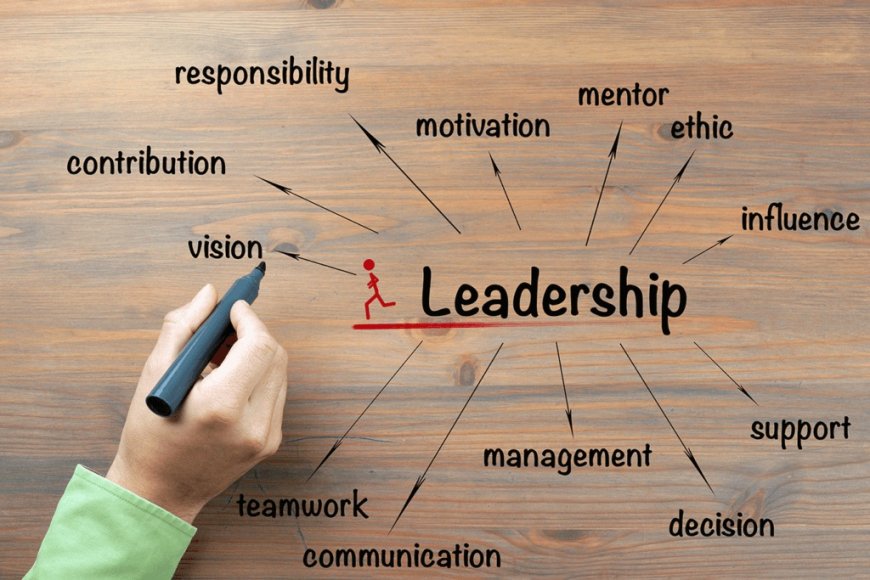What Is Team Leadership and How Can It Drive Success?
In today’s fast-paced business environment, effective team leadership is more important than ever. A successful leader doesn’t just manage a team; they inspire, guide, and bring out the best in their team members. Whether in a corporate setting, a startup, or even a sports team, team leadership plays a pivotal role in ensuring that goals are met, productivity is high, and morale remains strong.

In today’s fast-paced business environment, effective team leadership is more important than ever. A successful leader doesn’t just manage a team; they inspire, guide, and bring out the best in their team members. Whether in a corporate setting, a startup, or even a sports team, team leadership plays a pivotal role in ensuring that goals are met, productivity is high, and morale remains strong. But what exactly does team leadership entail, and why is it such an essential component of any organization? This post delves into the key principles of team leadership, its benefits, and how you can cultivate effective leadership within your team.
Understanding Team Leadership
Team leadership is the ability to guide and influence a group of individuals to work collaboratively towards achieving common goals. Unlike individual leadership, which focuses on a single person’s development or success, team leadership is about fostering synergy within a group, ensuring each member understands their role, contributes effectively, and works together in harmony. It requires a combination of communication skills, emotional intelligence, strategic thinking, and adaptability.
The Role of a Team Leader
A team leader is not simply someone who delegates tasks and oversees work. A good team leader is someone who:
-
Motivates team members to perform at their best
-
Communicates clearly and ensures everyone is on the same page
-
Supports team members in their personal and professional development
-
Guides the team towards achieving objectives while overcoming obstacles
-
Evaluates performance and provides constructive feedback
By performing these duties, a team leader can create a productive environment where individuals feel valued and are motivated to contribute to the team’s success.
Key Skills for Effective Team Leadership
While leadership is a skill that can be developed over time, certain traits and abilities are essential for team leadership to be successful. Let’s break down the key skills that every leader should cultivate to guide their teams effectively.
Communication and Listening
Effective communication is the cornerstone of team leadership. Leaders must be able to convey their ideas clearly and persuasively. They must also listen actively to their team members, as this creates an open channel for feedback, ideas, and concerns. Good communication fosters collaboration and ensures everyone is aligned toward the team’s goals.
Why Listening Is Just as Important
Listening is just as crucial as speaking when it comes to team leadership. Leaders who listen to their team members can identify potential issues early on, understand the individual strengths and weaknesses of their team, and create solutions that work for everyone.
Emotional Intelligence
Another vital skill for team leadership is emotional intelligence (EQ). EQ refers to a leader's ability to understand and manage their emotions, as well as the emotions of others. A leader with high emotional intelligence can navigate difficult situations, motivate team members, and defuse conflict before it escalates.
Building Strong Relationships
Leaders with high EQ are excellent at building strong, trust-based relationships within the team. They know how to manage stress, show empathy, and handle interpersonal dynamics, which helps maintain a harmonious and productive work environment.
Delegation and Trust
Team leadership involves delegation—knowing how to assign tasks to the right person and trust them to execute their responsibilities. A good leader doesn’t micromanage but instead empowers team members to take ownership of their roles. Trusting your team members not only boosts their confidence but also improves productivity, as they feel more accountable for their work.
Why Delegation Enhances Team Leadership
Delegation ensures that a leader isn’t overwhelmed with responsibilities and that the team is working efficiently. When delegation is done correctly, it increases the overall capacity of the team to handle larger workloads and fosters a sense of responsibility within each team member.
The Impact of Strong Team Leadership on Organizational Success
Effective team leadership is not only beneficial for the team members themselves but also for the overall success of an organization. When leadership is done right, it can improve performance, boost morale, and drive results.
Increased Productivity
A well-led team is a productive team. When team leadership is strong, team members are motivated to put forth their best effort. They are clear on their goals, understand their roles, and feel a sense of accountability for their work. This leads to greater efficiency and higher output.
The Power of Motivation in Team Leadership
Motivated employees are more likely to go the extra mile in their work. A strong leader knows how to inspire their team to be passionate about their tasks and feel a sense of pride in their work, which drives productivity.
Enhanced Collaboration and Innovation
When a team leader fosters an open and inclusive environment, it encourages collaboration. Team members are more willing to share ideas, take risks, and work together to find creative solutions to challenges. This kind of collaboration is key to innovation and problem-solving.
Building a Culture of Innovation
Team leadership can set the tone for a culture of innovation. Leaders who encourage creative thinking and support new ideas allow their team to think outside the box and come up with fresh solutions to problems, which can lead to breakthroughs and success.
Higher Employee Satisfaction and Retention
A positive work environment created through effective team leadership directly contributes to higher employee satisfaction. When employees feel respected, valued, and supported, they are more likely to stay with the organization long-term, reducing turnover and the costs associated with hiring new staff.
The Role of Emotional Support in Employee Retention
Leaders who show genuine care for their team members' well-being build strong bonds of loyalty. Providing emotional support, recognizing achievements, and creating a supportive work culture can significantly increase employee satisfaction and retention rates.
Challenges in Team Leadership and How to Overcome Them
No leadership journey is without challenges. Here are some common issues leaders face when it comes to team leadership, along with strategies for overcoming them.
Managing Conflicts
Conflict is inevitable in any team. Whether it's personality clashes or disagreements over project direction, team leaders must know how to manage conflict constructively. Leaders who address conflicts early on and mediate disputes can prevent them from escalating and disrupting the team’s performance.
The Role of Mediation in Conflict Resolution
Effective leaders can serve as mediators when conflicts arise, ensuring that all parties are heard and that a fair solution is reached. By doing so, they maintain team cohesion and prevent disruptions to productivity.
Maintaining Motivation During Setbacks
Even the best teams face setbacks. Whether it’s a missed deadline, an unexpected challenge, or a failure, team leadership requires resilience. A strong leader must keep their team motivated during difficult times and remind them of their goals and purpose.
Staying Focused on the Bigger Picture
During tough times, leaders should help their team maintain focus on the larger objective. Encouraging a positive mindset and highlighting small wins can help keep morale high and lead the team toward success, even after setbacks.
Conclusion
Team leadership is a critical factor in the success of any group, whether in business, sports, or any other field. Strong leadership fosters collaboration, enhances productivity, and drives results. By mastering key skills such as communication, emotional intelligence, and delegation, leaders can create an environment that brings out the best in their team. Although challenges may arise, effective team leadership can overcome these obstacles and lead teams to long-term success. By focusing on the development of leadership skills and maintaining a supportive and empowering environment, any team can thrive and reach its full potential.







































































































![Building A Digital PR Strategy: 10 Essential Steps for Beginners [With Examples]](https://buzzsumo.com/wp-content/uploads/2023/09/Building-A-Digital-PR-Strategy-10-Essential-Steps-for-Beginners-With-Examples-bblog-masthead.jpg)





























![Senior Support Engineer - US West [IC3] at Sourcegraph](
https://nodesk.co/remote-companies/assets/logos/sourcegraph.f91af2c37bfa65f4a3a16b8d500367636e2a0fa3f05dcdeb13bf95cf6de09046.png
)


















